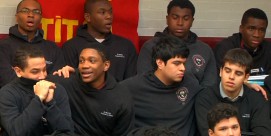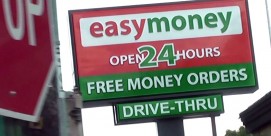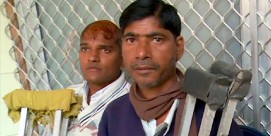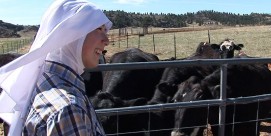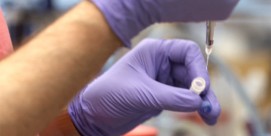In This Episode << SLIDE LEFT TO SEE ADDITIONAL SEGMENTS
Dr. Roseanne Cook Extended Interview
Read more of R & E correspondent Judy Valente’s interview with Dr. Roseanne Cook:
Q: Did you enter religious life with the idea of becoming a physician?
A: No, I really didn’t. I was a teacher for many years, and I didn’t think about becoming a physician until I was in the community for, well, 12, 15 years — something like that.
Q: What sparked that?
A: It came to me, actually, through prayer. I had made a 30-day retreat, and while on retreat a year or two later, I was praying one evening, and it just seemed as if the Lord wanted me to do something with my life more than I was doing. Over the next few days of retreat, it finally came into focus that that’s probably what it was. A friend of mine who was a physician’s assistant in the mountains of Peru had planted the seed of the idea several years before that.
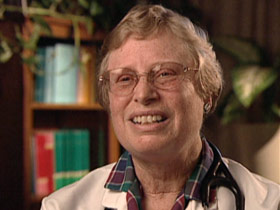
Q: When you went to medical school, did you expect to be working overseas, or in the U.S.?
A: I expected to be working in Latin America, in particular in Peru. But the Shining Path guerrilla movement was very, very active in the mountains there, and they were targeting the clinic that the sisters had, and the peasants that were coming to the clinic, and the sisters themselves. It became obvious that it was better, rather than to lose life, to go ahead and move out of that area. Then there was no clinic in Peru for me to work with. The sisters that remained there went into health education and went out into the community to help teach hygiene and good health habits and so on, rather than doing actual clinical work. They set up their headquarters at the mouth of the Amazon, around the northern part of the country.
Q: And then how did you end up in Alabama?
A: I’m probably one of the only physicians recruited by their nurse practitioner. Sister Jane Kelley, who has been part of this clinic since its inception, kept calling me during medical school and then later on during residency training and saying, “Come on down and see what we have down here. We need a doctor. We need a doctor.” During the third-year residency program, we were given a month to travel around and try to see what location we’d like to practice in. I came to a rural Appalachia area of Kentucky, rural Georgia, Alabama, and then went on to [the] Delta region of Mississippi. I finally decided to come back here.
Q: What did Sister Jane tell you about the conditions at that time?
A: She told me that the people were quite poor. Most of them did not have access to medical care of any kind of quality. The doctors that they had were all temporary; they would just come to pay off their [medical school] debts and then move on. And she asked if I would come to stay.
Q: Did you know immediately you wanted to be here?
A: Part of my decision was the fact that there were other Sisters of St. Joseph working right here in the area. There would be community support, and I wouldn’t be out there all by myself, setting up a practice and so on.
Q: How hard is it for you to see as many as 30 patients a day?
A: Well, you go home tired but, you know, each patient has their own story to tell. Each room that you go into, there are some differences, and no two days are alike. It’s not boring by any means. Sometimes it’s a little fatiguing. We do a lot of walking because we try to provide medicine for people, and so we’re walking back to the pharmacy all the time in between patients. But it’s not too bad. Not too bad.
Q: What are the types of problems people come to see you about?
A: The most common problems that we see are associated with poor diet — diabetes and hypertension. And then flowing from those two diseases would be renal problems, cardiac problems, strokes. We see a lot of people with back injuries, because the main employment here is the logging industry. Many of the men who come in have had a tree fall on their back, or have been in a motor vehicle accident, or have had a skidder that went wild, and they lost an arm or a hand and are disabled from that. We see a lot of people who have problems with overuse syndromes — women who work in the sewing factories around here who have to do the same motion over and over and over again, and they get carpal tunnel syndrome. This morning we saw a woman who had difficulty with her hand. The tendon sheaths were all scarred down. She had been ironing at a cleaning establishment for 20 years, holding onto a hard iron, and it’s ruined her right hand. We see a lot of injuries that come from chronic use, from hard use. But diabetes and hypertension are the two biggest that we see.
Q: You work the emergency room. You do some procedures that another doctor might send a patient to a specialist for.
A: I’m on the staff of our little county hospital, and there are three of us that are active. We each take one night a week on call, which means that we see anyone who comes into the emergency room. That would be from 5:00 in the evening to 7:00 in the morning. Then we have one weekend a month, ordinarily, when we start at 5:00 on Friday and end Monday morning at 7:00. On the weekend, we may be the only doctor in the county, and so we’re it. We see people who have motor vehicle accidents, people who fall out of trees, people who are in altercations and have knife wounds, fishhooks in hands, and children with upset stomachs. We see the whole range of things. If people are critically ill, mostly we will stabilize and transfer to a larger facility, because our little hospital doesn’t have any intensive care. We don’t have any on-staff surgeons. We don’t regularly do OB work, because we don’t have the insurance to do it. In order to get insurance to deliver babies, you have to have access to a C-section within 30 minutes, and we cannot. The next OB department is 40 miles away, and we can’t get up there in 30 minutes. So, we all deliver babies in the emergency room, but we’d rather we didn’t. You can’t send somebody out if they’re really ready.
Q: What are some of the other things that you do that a specialist would do in a bigger area?
A: We set uncomplicated fractures and put casts on, do skin biopsies, remove moles, sometimes remove cysts that are a little bit deeper than just the skin. We don’t have general anaesthesia. We wouldn’t be taking out an appendix or any kind of major abdominal surgery or anything like that. A lot of doctors won’t do simple casting, simple fractures anymore. They go to an orthopedic doctor for that. We see children. We don’t have a pediatrician on hand, so we take care of children. We do a certain amount with cardiac patients, if they’re stable and don’t want to be transferred to a larger facility. We will keep somebody who’s had an un-acute myocardial infarction. Sometimes we also take care of stroke patients at our little hospital. We take care of some bad abscesses and have to pack wounds. One of the things we do is house calls, something that a lot of doctors don’t do anymore. I also have a large number of nursing home patients — about 35, 36 nursing home patients who are in varying states of health or illness. Nowadays, people get sent out of the hospital much faster, and many times are a lot sicker when they go back to the nursing home.
Q: Why do you have to do house calls?
A: Because people’s transportation is so difficult in the country. Rural access is really a key problem — having any kind of transportation. There’s no public transportation available, and our older folks, many of them don’t drive. Younger people who would maybe be able to take them are off at work during the day. In some cases, it’s such a project to get the elderly dressed and into a car that it’s much easier for me to come to see them.
Q: How hard is it for people to get adequate health care in an area like this?
A: I would say it’s fairly difficult, really, because so many of the people that we take care of don’t have health insurance. Either they do domestic work, or they work for employers who don’t provide them with health care because they’re small operations — particularly our small trucking companies, who maybe have six or eight employees. Some of the smaller wood pulp manufacturing companies don’t have many employees, and so they don’t provide health insurance. And then a lot of our people also do farm work, and they don’t have health insurance there, either. The first question when you try to refer somebody is, “What kind of health insurance do they have?” And if they don’t have any, you don’t get an appointment very easily.
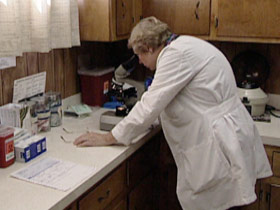
Q: How hard is it to recruit medical personnel to an area like this?
A: It’s very difficult, actually. Our little hospital has been wanting to increase our staff numbers, and they’ve had headhunters out there looking for people to come. And we just haven’t been able to find anybody.
Q: And it’s not just doctors, is it? It’s medical technicians.
A: Medical technicians, lab techs, x-ray. We have a perfectly good mammography setup at the hospital, but the girl that was doing them took leave when she had her baby and didn’t come back, and we don’t have anybody to do it. The mammography [equipment] has been sitting there idle for close to two years. They’ve been advertising regularly, and we just can’t get anybody in the area. Trained personnel are not common to our area. As a result, it’s very difficult to fill those places.
Q: What happens if someone needs a mammogram?
A: We have to send them up the road to Selma, which from here would probably be about 50 miles; to Greenville, another 25 miles; to Monroeville, which is probably about 45 miles; or else over to Thomasville, which is about 50 miles. Selma right now is overbooked; so we’d have to wait three or four months to get an appointment there.
Q: And here in your own clinic, some equipment is lying idle.
A: That’s right. We have two wonderful dental chairs that are fully equipped — new equipment — and no dentist. We have many, many people with terrible, terrible teeth and a lot of health problems as a result of poor dental care — practically absent dental care. It’s very common for me to look in someone’s mouth and find the teeth rotted off right to the gum. You have this little black nub right down there in the gum line, which is just the root of the tooth sticking up.
Q: It’s also access to prescription medicine, too.
A: Yes. It’s 25 miles in either direction to the nearest drugstore. Even if patients have Medicaid, many times it takes them $20 to get into town, because whoever they ask to drive them wants remuneration. As a result, even if they only have to pay a dollar, two dollars, three dollars for their prescription, you have to add their transportation cost on to that. It’s difficult. About 20 percent have Medicaid. The rest do not, and Medicare patients, for the most part, don’t have any pharmacy coverage and are all on fixed incomes. That makes it very difficult for people. More than 80 percent don’t have any way of getting their medicines.
Q: Why is it so hard, do you think, to recruit doctors and medical personnel here?
A: Most doctors want to be in a larger metropolitan area, where there are a lot of colleagues that they can call on for consults, for backup, for interaction of all kinds. Many times doctors’ families don’t want to come to a rural community, unless they’ve grown up in a rural area and want to go back. They’re just not interested in living out in the country, where you might have three restaurants. You have to drive up to Montgomery in order to see a movie in a theater, which would be about 70 miles away. The school system in our area is not really good. The school system is not integrated, even though it’s supposed to be. And the quality of education has been questioned over and over again by not just the ordinary citizens, but by the state board of education. So there are drawbacks. There’s also the fact that so many people are poor and don’t have insurance. As a result, the doctor’s worried about being able to make it financially in an area like this.
Q: What would a doctor earn here?
A: Well, it depends. If they’re in private practice, it depends on how good they are. I’m an employee of the Rural Health Medical Program, and so my salary is reasonable, based on federal guidelines. About 40 percent of our operating budget comes from a federal grant, and as a result, we’re able to see patients and discount the services and have federal monies come in and subsidize us, so that we can continue to function and stay afloat.
Q: Is there a general shortage of doctors in this country, in your view, or is it just a question of too many doctors in certain areas and not enough in other areas?
A: It’s a distribution problem, not a numbers problem. It stems from the fact that rural medicine has not been emphasized in medical school. Efforts are being made now to improve that; residents and medical students are being encouraged to take rotations with rural doctors. Almost every month of the year, we have either some medical student or resident here helping along with us and getting a feel for what rural medicine can be. We hope some of them may come back into a rural area when they get finished.
Q: Does it get lonely for you?
A: Yes, it is lonely. I do have my church community, and I have got some good friends in the area. I stay in touch with family. There’s always the phone and visits and so on. And I do get away. If I didn’t get away, it definitely would become too difficult. I enjoy gardening, and I’ve got a big yard to take care of. I enjoy refinishing furniture and music and reading. I do a pretty good job of taking care of my free time, whatever little bit there is. It gets filled up quickly, so I don’t have too much time to think about being lonely.
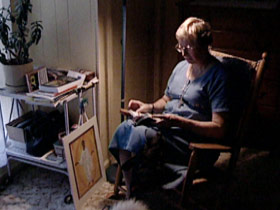
Q: Is your Catholicism ever in conflict with your medical work? For example, how do you handle birth control questions, or abortion?
A: We don’t advocate abortion. We try to advise other possibilities for a woman who becomes pregnant when she doesn’t want to be. We do have a family planning program we try to get people in, and we don’t impose lack of contraception on our patients, by any means.
Q: Is that because they’re mostly not Catholic?
A: There are very few Catholics in our area — very few Catholics. Our little mission church has maybe 30 parishioners. I don’t know how many churches there are, but we’ve got all kinds of churches. Catholics are a very, very small number in the area. It’s a way of not imposing my beliefs on someone else who doesn’t have those same beliefs. That wouldn’t be very fair to them.
Q: Do you think it makes any difference to the patients that you’re a Catholic sister?
A: I don’t think so. I don’t think most of our patients really know what a Catholic sister is, to tell the truth. They know that we care very much about them. They know that we go the extra mile. I’m not sure whether or not they see that as being a sister, or just being a good woman. I’m not positive about that. But I do know that most of our patients have never experienced the old-fashioned sister in the black-and-white hat. That’s just not part of their experience at all.
Q: Does it make a difference to you and how you view your patients that you’re a Catholic sister?
A: I think it does. I approach them with a great deal more love and reverence. I don’t see them as a client and me as a provider. I see them as another human being who is suffering, and I hope to bring healing to them.
Q: How does your spiritual life inform your medical work?
A: It definitely gives me the energy to come in each day with a cheerful spirit and a generous heart. Without that, I think that you could get pretty jaded seeing the things that you see day in and day out. Sometimes we see people taking advantage of the system, trying to get away with as much as they can get away with, people who don’t have insurance and we don’t find out until way later, people who aren’t willing to do their part to get better and who expect you to do it all.
Q: What is it about your spiritual life that gives you that cheerful spirit?
A: It’s knowing how loved you are. The good Lord is right there all the time and is very much protecting and guiding. That deep conviction and experience is the energy by which you function.
Q: What do you think would happen to this community if you were to retire or could no longer work here?
A: That will happen one of these days. I’m not getting any younger. Nobody’s here to stay. I would hope that we would find another physician who would be willing to come and stay. And I certainly would pray very hard that the Holy Spirit would inspire somebody to come.
Q: Do you think that will happen?
A: I hope so. We have a wonderful setup here. We have worked at making a clinic that is really comfortable to work in and pleasant to be in, and I would hope that when I would leave or when Sister Jane leaves, it wouldn’t just fall apart. I think that someone else would come.
Q: You’ve said the medical profession is prejudiced against the poor. What did you mean by that?
A: Now that it’s a “for-profit” industry, it’s losing some of its professionalism and altruism; the medical profession is looking for repayment — money. Let’s just put it that way. If you don’t have access to money, then your case is not taken as seriously. That’s not true of everybody, but there is a tendency in that direction. Many people have experienced that when they have approached the medical profession, or have been in need of health care when they didn’t have their insurance card with them, as it were.
Q: What can be done to fix that?
A: I really believe that we as a nation should have a national health insurance program. We’re one of the only industrialized nations that do not have universal health coverage for our citizens. We keep talking about how wealthy we are as a nation, and yet we take very poor care of our own. I do believe we need to move in that direction. The number of employed people without insurance is growing, growing, growing every day. The other problem is tying insurance to employment. It is really not common sense, because when you actually have to use health care a lot, usually you become too ill to work. And then what happens? You’ve lost your job. You’ve lost your insurance. And many of our prices are inflated in order to cover this very problem — the people who become ill and are no longer able to work can’t get on Medicare right away and have huge bills because of lack of coverage. Health care really should be a public trust, just like education should be a public trust. It shouldn’t be left to our employers to cover us.
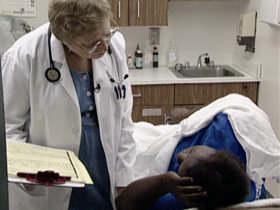
Q: What is the most difficult part of your job?
A: The weekend call is what gets to you the most, because you don’t take a day off then. Some weekends are very, very hectic. You don’t get a lot of sleep, and then you go into five days of work just like you normally would, with your normal call schedule that week. And you’re really exhausted by the end of that stint. You get two weeks without any breaks. That’s what I find the hardest.
Q: Have you ever been at personal risk in the time that you’ve been here?
A: Yes, I have. I was coming to work, and I was about four miles from the clinic, and some young men had the hood of their car up. They were parked on the edge of the road and looked like they needed some help. So, I stopped and jump-started them and put the jumper cables back in the trunk, got back in the car, got ready to leave, and one of them pulled a gun on me and hit me across the face, pushed me over on the other side. They drove me into a wooded area that was adjacent. They robbed me and knocked me out, threw me in the trunk of the car, slammed the trunk down, said, “You’re dead,” and then the bullets started flying into the trunk. Four bullets went into the trunk right where my head was.
Q: None of them hit you?
A: One zinged across my cheek, and that was it. When you talk about being loved and protected — the good Lord wants me here. Otherwise, I would’ve been dead back in December.
Q: Did that change your attitude at all about your work?
A: No. It was just one incident. It’s over with. It’s done. Well, it’s not quite done yet, because we still have a trial ahead of us. It was an experience that I wouldn’t like to do again, but from it I certainly found out how valued I am in the community, how loved I am. A lot of positive things came out [of] it, besides the bruises and so on. So, no, it doesn’t make me afraid. Definitely.
Q: Did it strengthen your resolve to stay here and continue the work?
A: It certainly did. I hadn’t even thought about leaving, actually. I don’t have any qualms. I still walk the dogs at night and live alone without any problems.
Q: Did you go right back to work?
A: Within two days I was back to work.
Q: How do you deal with the racial prejudice that still exists in this part of the country?
A: I find it difficult. Right now, a few of us formed a book club. It’s a racially mixed group, and we go to each other’s homes and share a meal once a month and have some really lively discussions. This is one way to break down some of the barriers, of the black community not socializing with the white community. The churches are separate. There are black Presbyterian churches, white Presbyterian churches, black Baptists, white Baptists. The most segregated time is Sunday morning, which is a scandal when you think about it. And yet, that’s the way it is right now. The thing that bothers me the most and that makes it hard to recruit people into the area is the fact that we still have a segregated school system. Our neighboring counties have integrated but, for some reason, our county has not. We live in hope that the time will come when it will happen, but it hasn’t happened yet.
Q: What’s the most rewarding aspect of your work?
A: My patients, and knowing you can help people, and that you really do help them. You see them get better. The people that you can’t help to get better, you help to be at peace with what they have going on. The appreciation that they show, the gratitude that’s there — yes, it’s the patients. That’s what keeps you here.
Q: Many people would look at you and say, “This is a happy, fulfilled woman, despite the difficult job that she’s doing.” What do you attribute that to?
A: I think it’s because I know I’m where I belong. My life is worthwhile, and I am helping people. That makes all the difference in the world. It’s probably “the grace of office,” as they say, and the blessings of the spirit that come from living a peaceful life.
Q: What can you say to help people in Chicago and Washington and New York understand the depth of what you’re dealing with here?
A: That’s awful hard, unless they experience it. We see people with blood pressures of 240 over 130, and they’re walking around and working every day, and they don’t feel bad; they’ve gotten so used to it. We have people, 35-year-olds with strokes that cripple them for life. We see people who have had broken bones that were not set and who end up with a crooked arm or leg. They just didn’t go to the doctor, or there wasn’t a doctor there for them — people who struggle for breath and live in houses that are substandard. When I came in 1986, 48 percent of the households that I served had no running water. It’s improved since then, but this is the situation. I made a house call and came with a walker for an elderly man. I ended up taking it back with me, because the flooring had so many holes in it that getting all four feet to land on solid ground in this house would have been almost an impossibility. I came back with a cane, because I figured that would be a little safer for him. A lot of people around here have trailers. They just park them on a hillside somewhere, and then the pipes go out, down a ditch. They don’t have septic tanks in some cases. Children with intestinal parasites are fairly common. Alabama doesn’t do very well with infant mortality. We’re not good on a lot of things that way. People have tuberculosis that’s not recognized until they’ve infected a lot of other people. We do have a lot of infections, people with bad abscesses from skin infections that aren’t taken care of. People have had lacerations that weren’t stitched up, and so they get bad scars — all kinds of things like that. In fact, I had one man who put cobwebs into a laceration on his hand in order to stop the bleeding. You should have seen me with little tweezers, trying to pull the cobwebs out.
Q: Because he had no gauze or cotton?
A: Right, exactly. We do see an awful lot of bad things that wouldn’t be seen in an area where health care was more available.


